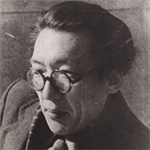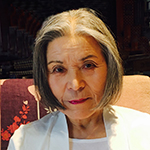Cave Dwelling Song
The more emaciated a body is
the fatter a soul becomes.
From a spring I drink the water,
crushed with moon and stars.
Struck by the frosty knife,
my youth proffered me
and injured by the war machine
I fled alone, nursing my wound.
Huge is the reward
for being alive!
So I pluck the weeds
and cry.
O, my dream, today,
again run through the wide plain.
The leaves fall
in the deep mountain valley.
암혈의노래
야외면 야월 수록
살지는 혼
별과 달이 부서진
샘물을 마신다
젊음이 내게 준
서리발 칼을 맞고
창이를 어루만지며
내 홀로 쫓겨왔으나
세상에 남은 보람이
오히려 크기에
풀을 뜯으며
나는 우노라
꿈이여 오늘도
광야를 달리거라
깊은 산골에
잎이진다
The Road to Search for the Light
Walking on the mountain path with deer and coyote,
as we drink the water springing from the cracks of a boulder,
we hear from a distant slop, the sound of reed-flute
overflowing with the joy of life.
My eyeballs, resembling the sunflower each day,
are the bronze incense burner where plumes the lavender clouds.
At the sunrise over the east of Eastern Sea,
I will let out my bursting sorrows.
My feet, wounded from the sharp outcrops and thorn bushes,
after healing, when they brush by the flower petals,
picking the fruit in the green trees,
I nurture them with songs and dances.
The song I sing on the road in search of the light
becomes the wind that blow away the sad clouds.
빛을 찾아가는 길
사슴이랑 이리 함께 산길을 가며
바위 틈에서 어리우는 물을 마시면
살아 있는 즐거움의 저 언덕에서
아련히 풀피리도 들려오누나.
해바라기 닮아가는 내 눈동자는
자운 피어나는 청동의 향연
동해 동녁 바다에 해 떠오는 아침에
북바치는 설움을 하소하리라.
돌뿌리 가시밭에 다친 발길이
아물어 꽃잎에 스치는 날은
푸나무에 열리는 과일을 따며
춤과 노래로 가꾸어 보자.
빛을 찾아 가는 길의 나의 노래는
슬픈 구름 걷어가는 바람이 되라.
Translator’s Note:
Cho Ji Hoon (1920-1968) lived during the period of much violent political and social turbulence in Korea. From 1910 to 1945, Korea was ruled by the Japanese imperial power. After World War II, Korea became independent, and then tragically the country was divided into North and South. When the Korean War broke out on June 25, 1950, Cho Ji Hoon was 30 years old; a professor and father of two young children. Like many others, his experience of war was very tragic: his grandfather committed suicide over the atrocities, his mother and brother died, and his father and brother-in-law were taken to North Korea. The poems I have translated reflect the harsh realities of Cho Ji Hoon’s life.
During the Pacific War, Cho Ji Hoon received a medical exemption by the Japanese government because of a chronic illness. He was arrested by the Japanese police for collaborating with other scholars on a Korean dictionary project. After his release, he left Seoul for his hometown in the country, and built himself a little hut where he lived alone for a year. The poem “Cave Dwelling Song,” written during this period, reflects his reclusive mood. The title, “암혈(rock cave),” evokes the historic resonance to Literates’ who chose to live a life of solitude. To young Koreans at the time, escaping the draft was a life and death issue. He states: “huge is the reward for being alive!” Yet, his way of rejoicing was to have fellowship with nature and humanity: “So I pluck the weeds, and cry.” For Cho Ji Hoon, connecting with nature is to be in touch with the primordial life force and its necessity.
The poem “The Road to Search for the Light,” published in 1959, opens with “Walking on the mountain path with deer and coyote.” How do you get a deer and a coyote to take a walk with you? This impossible situation is a metaphor for what the poet faced in the aftermath of the Korean War. Hostilities between the North and South continued, yet Ji Hoon’s beloved father was in the North while he remained in the South. His poetic imagination transcended that reality by “walking on the mountain path with deer and coyote.” This poem is a fine example of how he embraced the historic imperative of his time, fighting for the nation’s brighter future— “to search for the light.” It is a treacherous road with “sharp outcrops and thorns bushes,” he warns. The second stanza employs a paradoxical set of images, comparing his eyes to both sunflowers and a bronze incense burner. The poet’s eyes follow the sun every day “like sunflowers,” but also look back to history, to ancestors. Incense burners are used for ancestral ceremonies and almost every household in Korea would have kept this tradition in 1950s, at the time he wrote this poem. The incense pluming in the air is a way to summon the ancestral spirits to table.
Translating this poem, I ran into an issue with word “coyote(이리).” Literally and scientifically, it should be “wolf.” Coyotes are not native to Korea. However, I chose to translate “이리” as “coyote,” for the following reasons. I remember in Vermont, where we summered in the Green Mountains, during the day we saw deer in the woods and at night heard coyotes howl. For American readers, it is easy to imagine the deer and coyote inhabiting the same space. To my ears, the “coyote” flows much better than “wolf” within the line. I take comfort in Lowell’s view of translation as an imitation.

Born in 1920, Cho Ji Hoon is a canonical poet of modern Korea and a renowned traditionalist of Korean aesthetics. Although his poetry is written in a modernist free-verse form, his poems are deeply rooted in the literary Sijo that began in 12th century and have an intense local flavor, imbued with the sounds, smells, and colors of pre-industrial Korea. In 1939, Cho Ji Hoon’s first poem appeared in the literary magazine MoonJang. In 1946, his poetry appeared in the collection, Cheongnok Jip (청록집) along with the works of Park Mokwohl and Pak Doo Zin. The three were known as “Cheongnokpa,” or the “Green Deer Poets.” A professor of Korean language and literature at Korea University for 20 years, Cho Ji Hoon served as the president of the Korean cultural society affiliated with the university and president of the Korean poet’s association. He received numerous literary awards and published five poetry collections, as well as many books related to Korean literature and culture.

Born and raised in South Korea, Sekyo Nam Haines immigrated to the U.S. in 1973 as a registered nurse. She received her undergraduate degree in American literature and writing at Goddard College Adult Degree Program. She continued her study of English literature at the Harvard Extension school and poetry with the late Ottone M. Riccio in Boston, MA. Her first book, Bitter Seasons’ Whip: The Translated Poems of Lee Yuk Sa, was published in April of 2022 (Tolsun Books). Her poems have appeared in the poetry journals Constellations, Off the Coast, and Lily Poetry Review. Her translations of Korean poetry by Cho Ji Hoon have or will appear in Interim, Asymptote’s translation Tuesday blog, The Fourth River, Tupelo Quarterly The Tampa Rewiew, May Day, and Consequence Forum. Her translations of Kim Sowohl’s poetry have appeared in The Harvard Review, The Brooklyn Rail: InTranslation, Ezra, and Circumference. Her translation of “The Dire Pinnacle” by Lee Yuk Sa appeared in And There Will Be Singing /An Anthology of International Writing by The Massachusetts Review. Sekyo lives in Cambridge, MA with her family.

 BACK TO ISSUE
BACK TO ISSUE